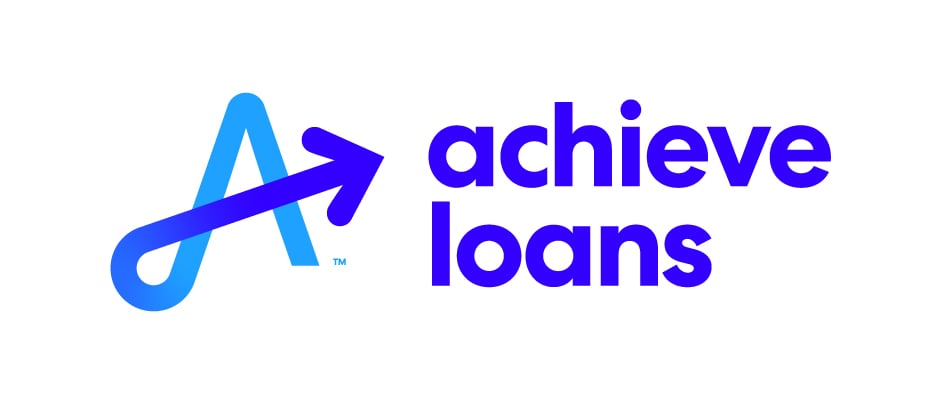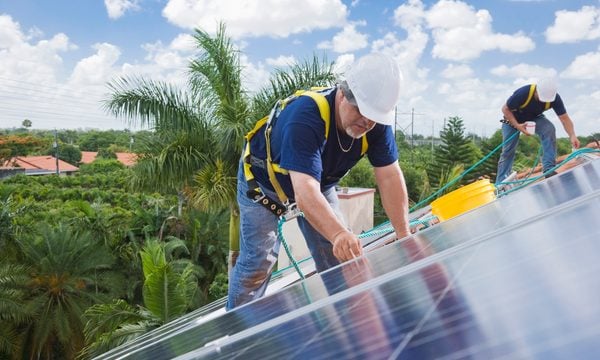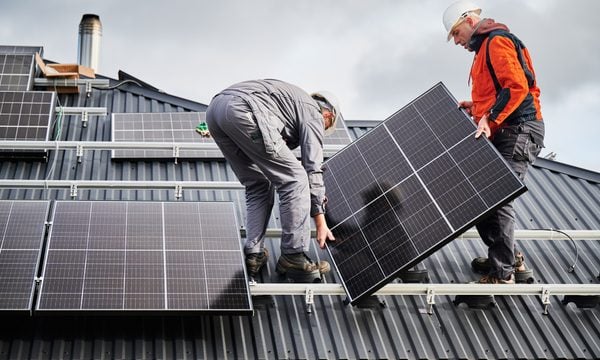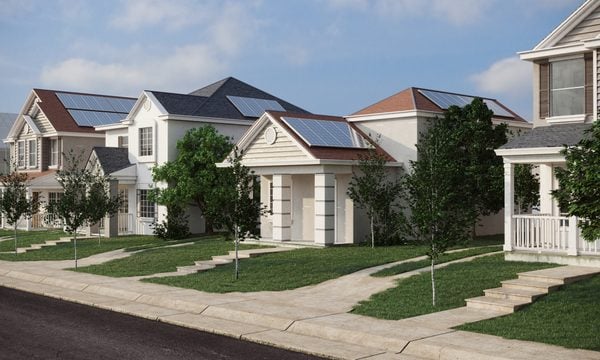How to DIY Solar Panels
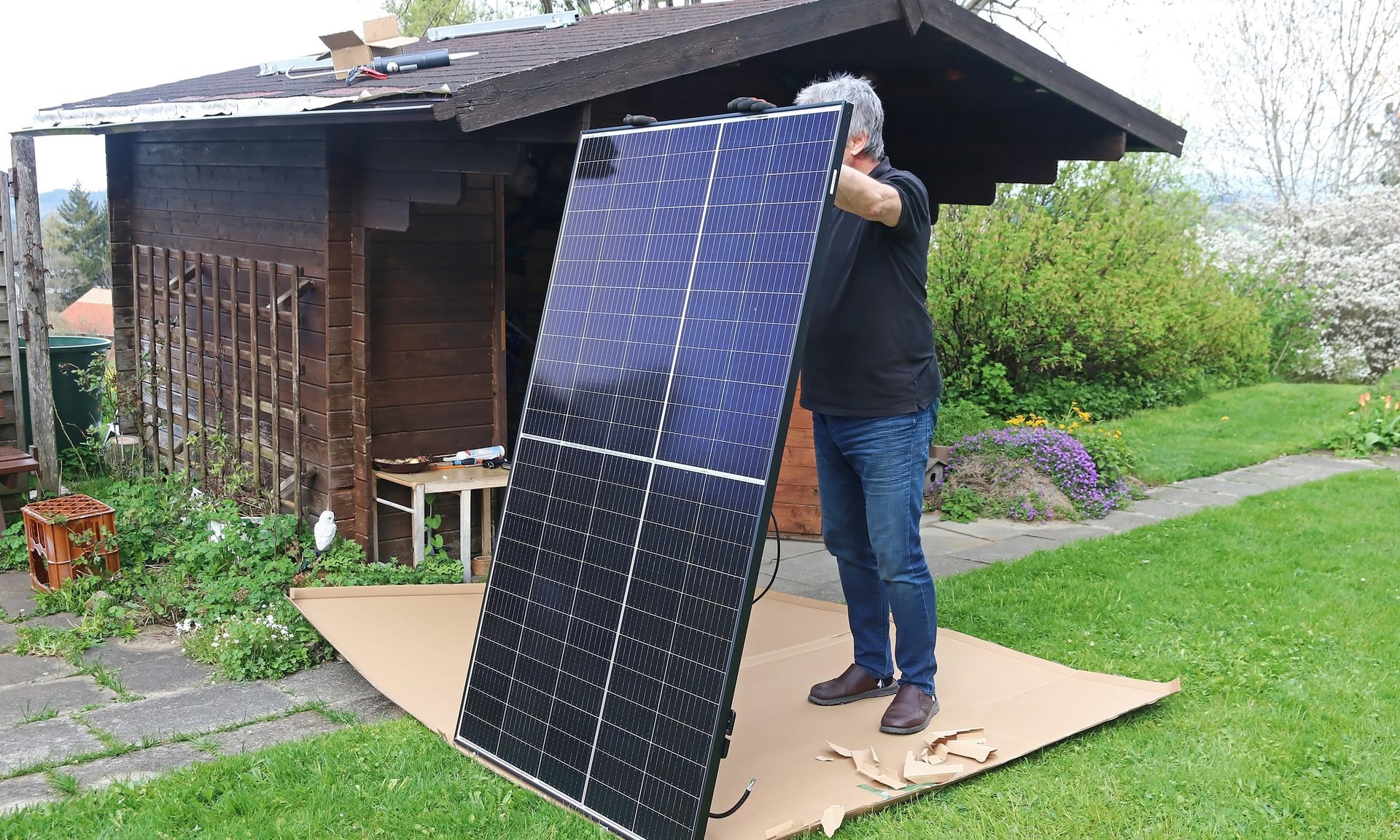
Some or all of the mortgage lenders featured on our site are advertising partners of NerdWallet, but this does not influence our evaluations, lender star ratings or the order in which lenders are listed on the page. Our opinions are our own. Here is a list of our partners.
Solar panels can save money or increase energy independence. If you want further savings, you can DIY solar panels, which requires more research and effort but can result in a cheaper system overall.
Can you build your own solar panels?
It is possible to build your own solar panels by purchasing individual solar cells, shatterproof glass, and the necessary wire and soldering equipment to assemble the panels .
- You’ll need to be knowledgeable about electricity in order to choose your cell voltages and power output correctly and safely.
- You’ll want to purchase high-quality equipment because a DIY solar panel will not be guaranteed with a warranty the way commercially-produced panels are.
In general, this level of do-it-yourself isn’t going to yield a cost benefit, however. DIYers often can save money when they create small-scale systems for an RV or tiny home using solar panel kits, or when they use manufactured panels but create their own DIY solar panel system.
How to DIY a solar panel system
If you’d prefer to spend time and effort rather than money, using manufactured panels to DIY your own system could be your answer.
1. Evaluate your roof or ground area and make a plan
Solar panels work best on south-facing roofs with an angle between 15 and 40 degrees, and you’ll want your roof area to be free of shade as much of the time as possible . Measure your roof, draw out where you’d ideally like to place your panels and calculate how many.
Evaluate how much electricity you want to generate, and determine the potential output of your system. Do some calculations to size your batteries, solar panels and wiring to conduct electricity appropriately without overloading and overheating the system. Free tools help people model their systems, but be prepared to do a lot of research if you don’t have an electrician background.
» MORE: How solar panels work
2. Understand the requirements for interconnection and permitting
Contact your electric utility if you intend to tie your system to the grid; your municipality may also require permits even if you intend to be off the grid. “It's technically possible to DIY aspects of a solar panel installation. However, it can be challenging due to the engineering drawings, permits, inspections and licensing requirements in most jurisdictions," Dan Massaad, CEO of Florida-based solar installer Guardian Home, said in an email.
3. Source your equipment carefully
Your exact needs will vary, but you’ll definitely need to source solar panels, mounting/racking supplies, electrical supplies, an inverter system and any batteries and related supplies.
You can purchase less-expensive used panels and batteries, or you can purchase new from manufacturers that offer some guarantee or warranty for their products.
“All of the solar panels I have, I purchased used from online sources; Facebook Marketplace and Craigslist are the two sites I use when searching,” said David Posluszny, prominent DIY solar expert and energy efficiency YouTuber, in an email. “I’m able to buy used panels far below retail price.”
4. Install yourself or contract elements of the project out piecemeal
People often opt to do parts of the installation process themselves and contract out other portions of the process for a bit less than a full installation would cost. For instance, a professional installer might quote you a lower rate if all you need is someone to physically mount the system that you’ve designed, sourced and permitted on your own. It just depends on who is available in your area and how flexible they are.
» MORE: How to compare solar quotes
How much does it cost to DIY your own solar panel system?
The average price of an 11 kW solar panel system is $29,926 before federal tax credits, according to EnergySage, a solar and home energy product comparison marketplace founded in 2012 . Anecdotally, DIYers are able to install their systems for substantially less, but there isn’t definitive data for all DIY installations.
Instead, there is a range of expected savings. You might see a modest 10% savings for a partially DIY project you design and source but still contract out to professionals piecemeal, or a 50% savings for a completely DIY project sourced with pre-owned panels/batteries. In the end, your savings really depend on so many factors that you’re better off getting professional quotes in your area as a baseline and then pricing out your own project in comparison.
Making this system worthwhile, however, also requires valuing your time. If this project is highly personally fulfilling and you have the spare time anyway, it will be easier to value those hours at a lower rate. If you have limited free time or don’t enjoy the manual labor and planning aspects of the project, consider whether the value of a DIY solar panels system is there.
Is it worth it to DIY solar panels?
In general, you’ll see the biggest savings from DIY solar panel installation if you enjoy the thorough research involved and the hours of work getting the project online after sourcing your materials.
“If you don’t feel safe, then you might want to hire a licensed installer,” Posluszny said. “Keep in mind, there are risks with everything, including solar. Our goal should be to minimize risk to acceptable levels. Electricity can harm and should be treated with respect… If at the end of that journey, you still feel like you're ‘missing something important’ definitely hire a licensed installer/electrician/construction person.”
Advantages of DIY solar panels
- You may save thousands of dollars in installation costs.
- Professional installers may have specific limits on what they are willing to customize, making DIY a better option for those who want an unusual or highly customized project.
- Learning about power generation and electrical work can be rewarding and fun.
Disadvantages of DIY solar panels
- For those who have limited free time or demanding day jobs, the hours of labor for the DIY project come at a high price.
- It may be safer to rely on experts to design and install a system due to the research necessary to have both a safe system and cost savings.
- Sourcing high-quality equipment can take more time and effort as a single purchaser because many PV equipment producers generally sell to professional installers.
Can I get financing for a solar panel system?
In addition to tax incentives and rebates, there are options available. Many solar installers offer financing, but you may also be able to finance your solar investment through a home equity loan or home equity line of credit (HELOC). These options may have lower interest rates than financing with an installer, future opportunities for refinancing and possible tax benefits.
Home equity loans and HELOCs are ways to borrow against the value of your home, converting equity into cash. With a home equity loan, you receive a lump-sum payment and then pay it back at a fixed interest rate over an agreed period of time, typically from five to 30 years. HELOCs are more akin to a credit card, something you use as needed. You’ll usually have 10 years to draw from the line of credit, during which time you only have to pay interest, and after that you pay both the principal and interest. HELOC interest rates typically are variable, meaning your monthly payment could rise or fall over time. And with each of these options, you're using your home as collateral.
Advertisement
Min. credit score 600 | Min. credit score 600 |
Min. down payment N/A | Min. down payment N/A |
Another option is a solar loan. Many banks, credit unions and online lenders offer these to fund solar panels and installation, with amounts typically from $1,000 to $100,000, and annual percentage rates ranging from 6% to 36%. They function like a personal loan: you receive a lump sum and repay it in equal monthly installments over a set period, typically two to seven years. And unlike with home equity financing, there is no collateral required for a solar loan. This means your home or solar panels aren’t at risk if you miss payments, but you may have to pay late fees.
So, yes, you likely can get financing. If you go this route, compare interest rates, terms and fees with any financing package that a solar provider may offer you to ensure you get the best deal.
Article sources
NerdWallet writers are subject matter authorities who use primary,
trustworthy sources to inform their work, including peer-reviewed
studies, government websites, academic research and interviews with
industry experts. All content is fact-checked for accuracy, timeliness
and relevance. You can learn more about NerdWallet's high
standards for journalism by reading our
editorial guidelines.
- 1. U.S. Department of Energy. Solar Photovoltaic Manufacturing Basics. Accessed Oct 5, 2024.
- 2. National Library of Medicine. Comprehensive Analysis of Solar Panel Performance and Correlations with Meteorological Parameters. Accessed Oct 5, 2024.
- 3. EnergySage. Solar panel cost in 2024: It may be lower than you think. Accessed Oct 5, 2024.
More like this
Related articles
AD
Save On Solar Without the Middleman
Free Instant Quote
on Project Solar's website

AD

Save On Solar Without the Middleman
- $750 OFF install with NerdWallet;
- SolarCare™: top-tier warranty & 25-year production guarantee;
- No sales commissions mean premium equipment & tech at up to half the price.
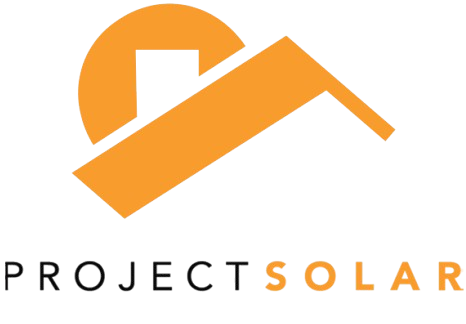
Free Instant Quote
on Project Solar's website




